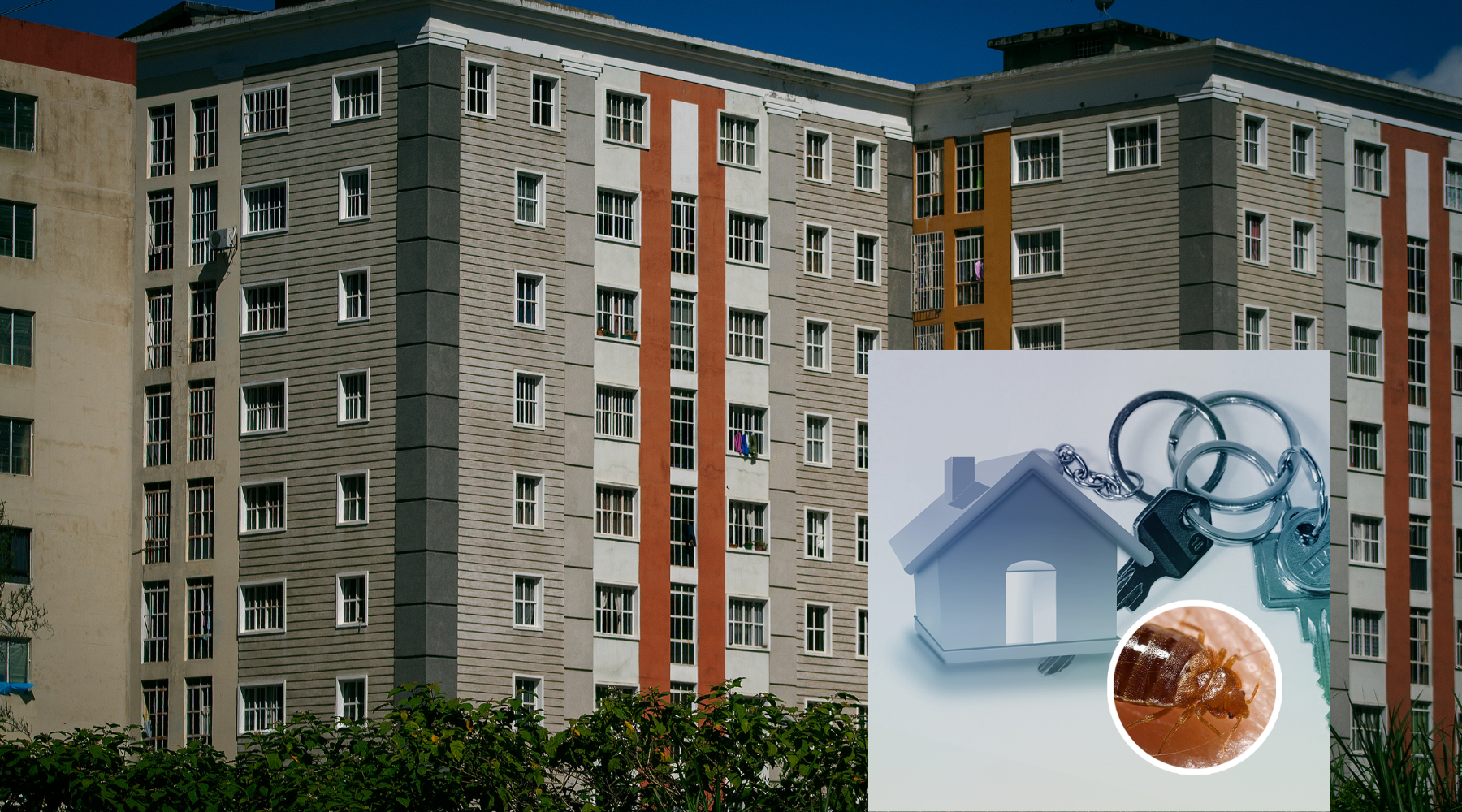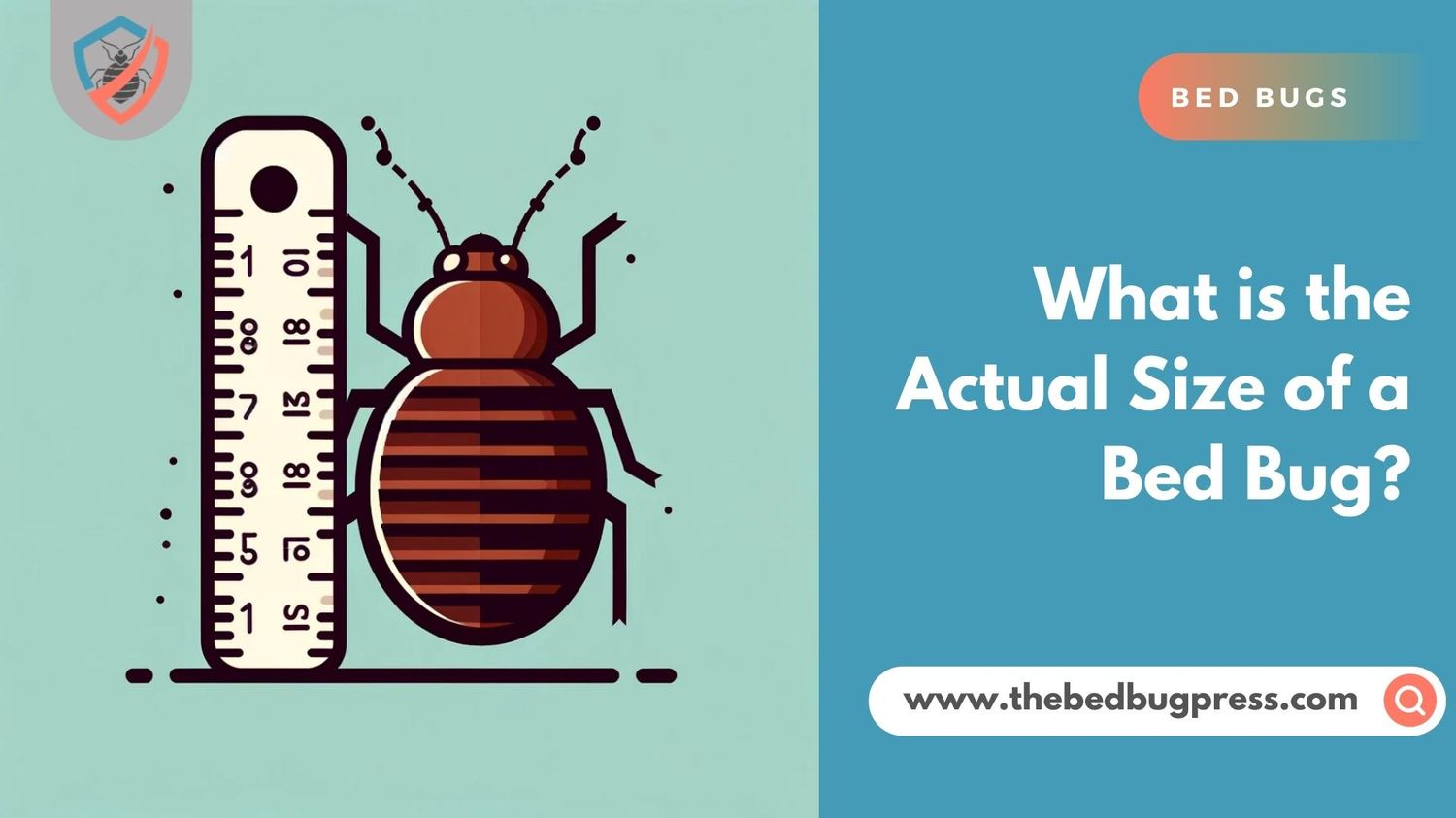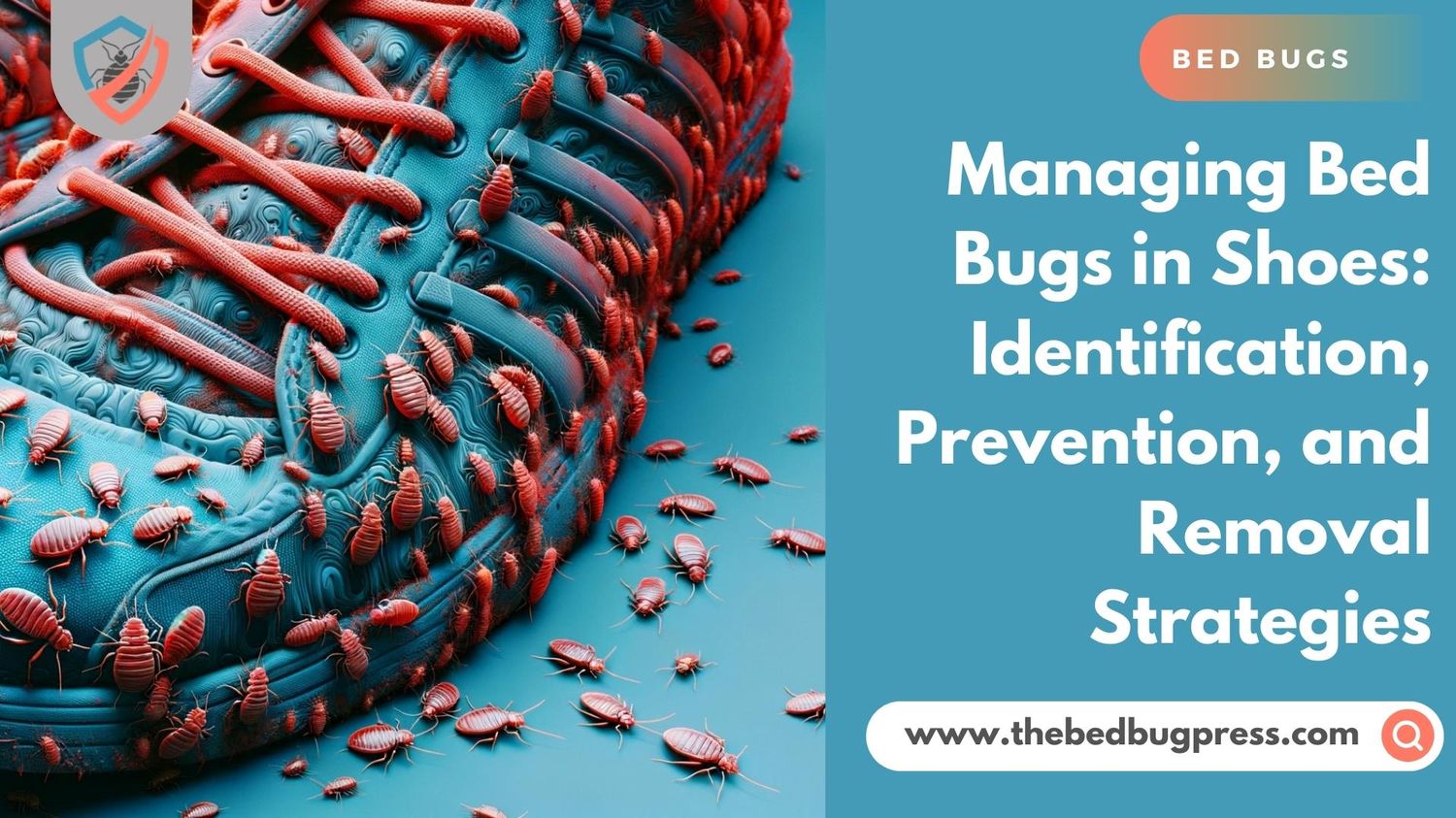Dealing with a bed bug infestation can be incredibly frustrating and stressful, especially if you’re renting a property. As a tenant, you have certain rights when it comes to the condition of your rental property, including the right to live in a safe and habitable environment free from pests like bed bugs.
But what happens if your landlord fails to provide such an environment? In this article, we’ll explore whether breaking a lease because of bed bugs is possible and what options tenants have when dealing with this issue.
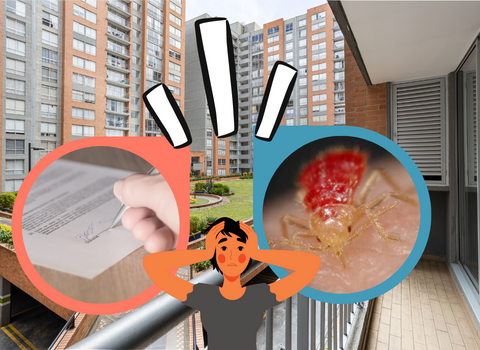
Landlord’s Responsibility for Bed Bugs
As a landlord, it is their responsibility to provide tenants with a safe and habitable living environment. This includes addressing any pest infestations that may arise in rental units, including bed bugs.
In many states, landlords are required by law to maintain their properties in a condition that meets certain health and safety standards.
If a tenant reports a bed bug infestation, the landlord should take immediate action to address the problem. This may involve hiring an exterminator or pest management professional or taking other steps to eliminate the bed bugs from the property. If a landlord fails to take action, they may be held responsible for any damages or losses suffered by the tenant as a result of the infestation.
Tenant’s Guide to Landlord Responsibility for Bed Bugs
If you’re a tenant dealing with a bed bug infestation, it’s important to know your rights and what steps you can take to hold your landlord responsible. Here are some key points to keep in mind:
Check your lease:
Your lease should outline the responsibilities of both the landlord and tenant when it comes to pest control. Make sure you understand what is expected of each party.
Notify your landlord:
As soon as you suspect a bed bug infestation, notify your landlord in writing. Be specific about the location and severity of the problem.
Request action:
Ask your landlord to take immediate action to address the pest infestation here, such as hiring an exterminator or taking other steps to eliminate the bed bugs from the property.
Follow up:
If your landlord fails to take action, follow up with them in writing and document all communication. Consider contacting local housing authorities or seeking legal advice.
Mitigate damages:
Take steps to mitigate any damages caused by the infestation, such as washing bedding and clothing in hot water or vacuuming regularly.
Remember, as a tenant you have certain rights when it comes to living in a safe and a habitable housing environment free from pests like bed bugs. Don’t hesitate to assert those rights if necessary.
Reporting Bed Bugs to Your Landlord
If you suspect a bed bug infestation in your rental unit, it’s important to report the issue to your landlord as soon as possible. Here are some steps you can take:
Check for signs of bed bugs: Look for small reddish-brown insects or their shed skins in and around your bed, couch, and other furniture. You may also notice small red bites on your skin.
Notify your landlord in writing: Send a written notice to your landlord detailing the suspected bed bug infestation and requesting that they take action to address the problem.
Provide evidence: Include any evidence you have of the infestation, such as photos or samples of the bugs or their shed skins.
Request action: Ask your landlord to take immediate action to address the infestation, such as hiring an exterminator or taking other steps to eliminate the bed bugs from the property.
Follow up: If your landlord fails to take action within a reasonable time frame, follow up with them in writing and document all communication.
Remember, it’s important to act quickly when dealing with a bed bug infestation to prevent it from spreading and causing further damage. By notifying your landlord promptly and providing evidence of the problem, you can help ensure that they take appropriate action to address the issue.
Preparing for an Exterminator’s Inspection
If you’ve scheduled an exterminator to inspect your home for a potential bed bug infestation, there are several steps you can take to prepare:
Declutter: Remove any unnecessary clutter from your home, especially in and around the areas where you suspect bed bugs may be present. This will make it easier for the exterminator to conduct a thorough inspection.
Launder bedding and clothing: Wash all bedding, clothing, and linens in hot water and dry them on high heat to kill any bed bugs that may be present.
Vacuum thoroughly: Vacuum all carpets, upholstery, and mattresses in your home to remove any bed bugs or eggs that may be present.
Seal cracks and gaps: Use caulk or other sealants to fill in cracks and gaps around windows, doors, baseboards, and other areas where bed bugs may enter your home.
Be prepared to answer questions: The exterminator may ask you questions about when you first noticed the problem, where you have seen signs of bed bugs, and whether anyone in your household has experienced bites or other symptoms.
Keep in mind that the goal of preparing for an exterminator’s inspection is to make it as easy as possible for them to identify any potential sources of a bed bug infestation. By following these steps and being prepared to answer questions about the situation in your home, you can help ensure a more effective inspection and treatment process.
Who Pays for Bed Bug Extermination?
The responsibility for paying for bed bug extermination in a rental property can vary depending on the specific circumstances and the terms of the apartment or lease agreement.
In general, landlords are responsible for maintaining their properties in a habitable condition, which may include addressing bed bug infestations. However, if the tenant caused the bedbug infestation through their actions (such as bringing in infested furniture), they may be responsible for the cost of extermination.
What if Your Landlord Refuses to Exterminate Bed Bugs?
If your landlord refuses to address a bed bug infestation in your rental property, you may have legal options available to you. Depending on your state and local laws, you may be able to withhold rent, break your lease, or take legal action against your landlord.
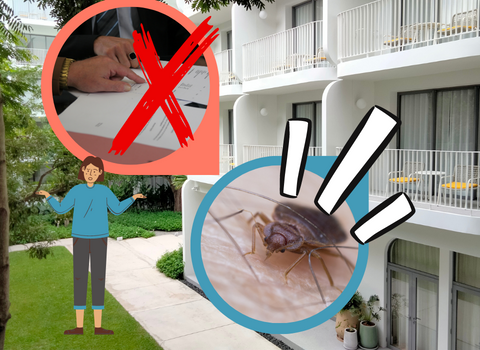
Tenant’s Right to Know About Past Bed Bug Problems in Rental Properties
In many states, landlords are required by law to disclose any past bed bug infestations to prospective tenants before they sign a lease agreement. This information can help tenants make an informed decision about whether to rent a particular property or not.
Breaking a Lease Due to Bed Bugs: Is it Possible?
Breaking a lease due to a bed bug infestation is possible, but it can be difficult. In most cases, tenants will need to provide evidence that their landlord has failed to address the bed bug problem despite repeated requests and attempts at remediation. Tenants should also review their lease agreement carefully before attempting to break their lease, as there may be penalties or other consequences for doing so.
Terminating a Lease Because of Bed Bugs: What You Need to Know
If you are experiencing a bed bug infestation in your rental property and your landlord has failed to address the problem, you may be able to terminate your lease early. However, it’s important to follow the proper legal procedures and document all communication with your landlord before taking this step.
Rental Property Conditions for Tenants Regarding Bed Bugs
Tenants have certain rights when it comes to bed bugs in rental properties. Landlords are generally responsible for maintaining their properties in a habitable condition, which includes addressing bed bug infestations. However, tenants also have responsibilities such as reporting any issues promptly and cooperating with the landlord’s attempts at remediation.
Rental Property Conditions for Landlords Regarding Bed Bugs
Landlords must provide safe and habitable living conditions for their tenants, which includes addressing bed bug infestations if they occur. This may include hiring a professional exterminator, providing proper notice to tenants about the issue, and taking steps to prevent future infestations.
Who is Liable for a Bed Bug Infestation?
Determining liability for a bed bug infestation in a rental property can be complex and may depend on several factors. In general, property owners are responsible for maintaining their properties in a habitable condition, which includes addressing bed bug infestations if they occur. However, tenants also have responsibilities such as reporting any issues promptly and cooperating with the landlord’s attempts at remediation.
If the infestation is caused by the tenant (such as bringing in infested furniture), the tenant may be held liable for the cost of extermination. If the landlord fails to address the issue despite repeated requests and attempts at remediation by the tenant, the landlord may be held liable for damages.
Both landlords and tenants need to understand their rights and responsibilities when it comes to bed bug infestations in rental properties. Open communication, prompt reporting of issues, and swift action can help prevent small problems from turning into larger ones that are more difficult (and expensive) to resolve.
When Can a Tenant Leave Because of a Bed Bug Infestation?
If a tenant is experiencing a bed bug infestation in their rental property, they may be able to terminate their lease early under certain circumstances. However, it’s important to follow the proper legal procedures and document all communication with the property manager or owner before taking this step.
In general, a tenant may be able to leave the apartment building because of a bed bug infestation if:
The landlord has failed to address the issue despite repeated requests and attempts at remediation by the tenant.
The infestation is so severe that the rental property is no longer habitable or safe for occupancy.
The tenant can prove that the infestation was present before they moved into the rental property.
However, each situation is unique and may depend on several factors such as local laws and lease agreements. Tenants need to consult with an attorney or housing agency before terminating their lease due to a bed bug infestation.
Rules on Breaking a Lease Due to Bed Bugs
Rules on breaking a lease due to bed bugs can vary depending on the state and local laws, as well as the terms of the lease agreement. In general, tenants may be able to break their lease for bed bug violations if the infestation is severe or if the landlord has failed to address the issue despite repeated requests and attempts at remediation.
However, tenants need to follow proper legal procedures and document all communication with the landlord before taking this step. Here are some general guidelines for breaking a lease due to bed bugs:
Notify the landlord: As soon as you suspect a bed bug infestation in your rental property, notify your landlord in writing. Keep a copy of your notification for your records.
Allow access for inspection and treatment: Cooperate with your landlord’s attempts at inspection and treatment of the rental property for bed bugs.
Follow up in writing: After each interaction with your landlord regarding the bed bug infestation, follow up in writing (such as an email) summarizing what was discussed or agreed upon.
Document damages: Take photos or videos of any damage caused by the bed bug infestation, such as ruined furniture or clothing.
Consult with an attorney or housing agency: Before breaking your lease due to a bed bug infestation, consult with an attorney or housing agency to understand your rights and responsibilities under local laws and your lease agreement.
Breaking a lease can have serious consequences such as losing your security deposit or being held responsible for rent payments until a new tenant is found. It’s important to carefully consider all options before taking this step.
Preventing and Managing Bed Bugs in Rental Properties
Preventing and managing bed bug bites and bugs in rental properties requires a collaborative effort between property owners and tenants. Here are some steps that can be taken to prevent and manage bed bug infestations:
Regular inspections: Landlords should conduct regular inspections of their rental properties for signs of bed bugs, such as shed skins or blood spots on sheets.
Prompt reporting: Tenants should report any suspected bed bug infestations to their landlord immediately. Early detection is key to preventing a small problem from turning into a large one.
Prompt treatment: Landlords should promptly address any reported bed bug infestations by hiring a licensed pest control professional to inspect and treat the rental property.
Education: Both landlords and tenants should educate themselves about bed bugs, how they spread, and how to prevent them from entering the rental property.
Communication: Open communication between landlords and tenants can help prevent misunderstandings or delays in addressing a bed bug infestation.
Cleanliness: Keeping the rental property clean and clutter-free can help prevent bed bugs from taking up residence.
Encasements: Mattress encasements can help prevent bed bugs from hiding in mattresses or box springs.
Discarding infested items: Infested items such as furniture or bedding should be properly disposed of to avoid spreading the infestation to other areas of the rental property.
By working together, landlords and tenants can help prevent and manage bed bug infestations in rental properties, creating a healthier living environment for all occupants.
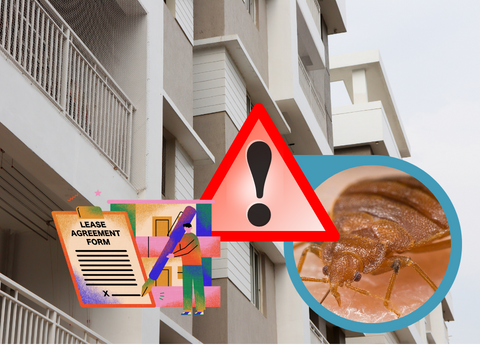
Dealing with a Bed Bug Infestation at Your Rental Property
Dealing with a bed bug infestation at your rental property can be really stressful, but don’t worry – there are steps you can take to address the bed bug issue in a friendly and cooperative manner:
Talk to your landlord: If you think you have bed bugs, let your landlord know right away. They want to make sure you’re living in a safe and comfortable space.
Let pest control do their job: If your landlord hires pest control professionals to inspect and treat for bed bugs, work with them by allowing access to the unit.
Follow up in writing: After talking with your landlord about the bed bug situation, send an email summarizing what was discussed or agreed upon.
Call a licensed pest control professional: If you’re a landlord dealing with bed bugs, call in the professionals to inspect and treat the affected unit(s). This may take multiple visits over several weeks or months.
Get rid of infested items: Toss out any infested items like bedding or furniture so that the problem doesn’t spread further.
Encourage cleanliness: Remind tenants to keep their units clean and tidy to prevent future infestations from happening.
Educate yourself and others: Learn more about bed bugs, how they spread, and how to prevent them from entering the rental property. Share this information with tenants so everyone is on the same page.
Remember that it takes time and effort to deal with a bed bug infestation, but by working together we can create a healthier living environment for everyone involved!

